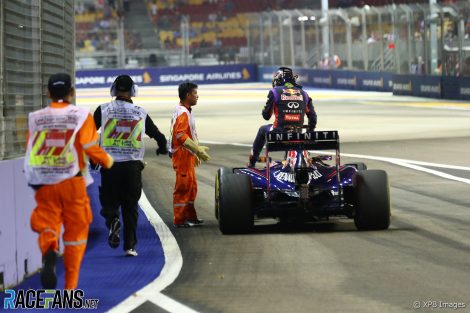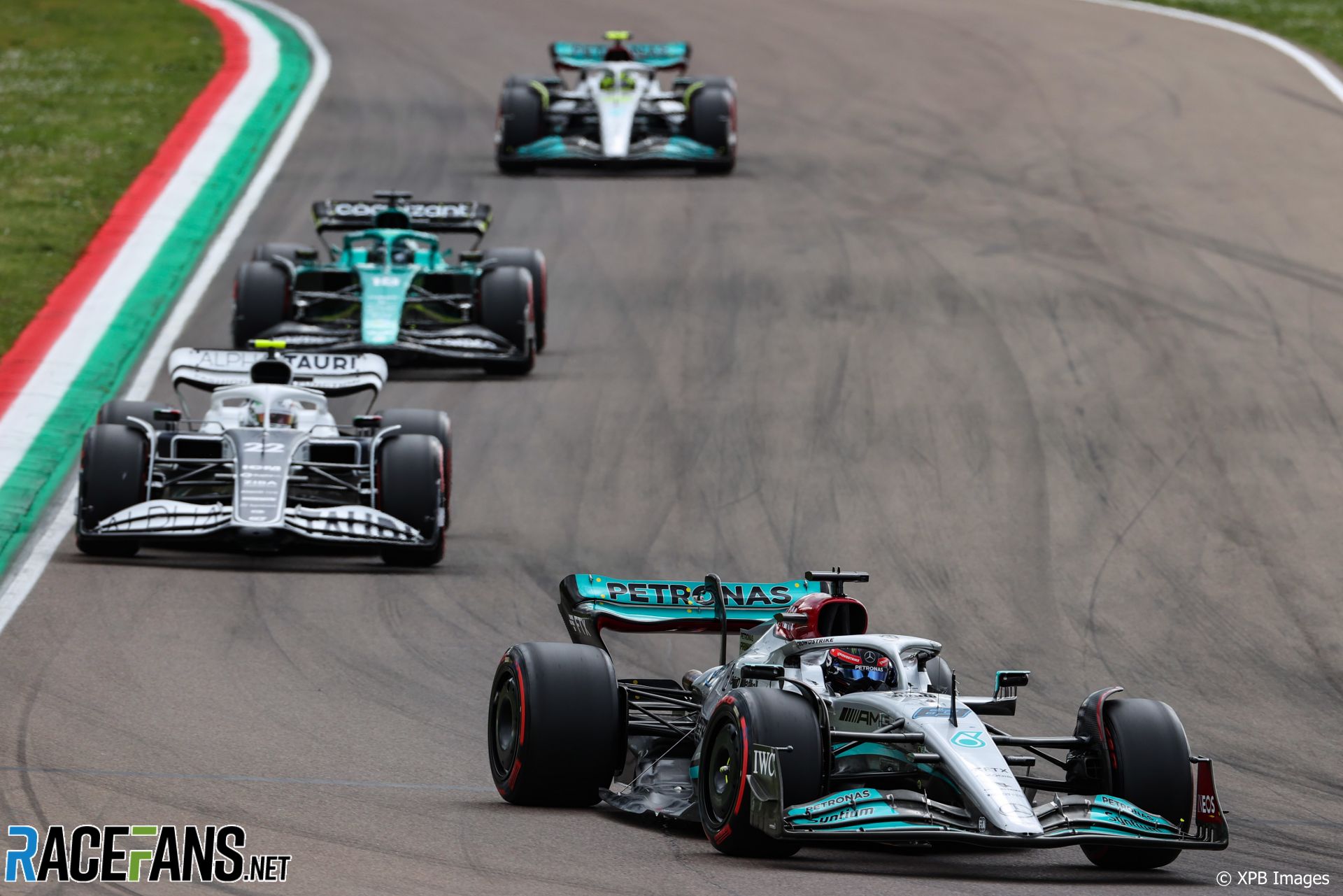Mercedes are not taking it for granted they will quickly return to competitiveness after their poor 2022 campaign, says team principal Toto Wolff.
The team failed to win the constructors championship for the first time since 2013 this year. They laboured with an uncompetitive car from the outset of the season and did not win a race until the penultimate round.Wolff says his team has taken heed of past occasions when a team’s dominance of F1 has come to an end in order to understand where it went wrong. He cited Red Bull’s run of titles from 2010 to 2013 and the success Ferrari enjoyed in the first half of the 2000s with Michael Schumacher.
“With Ferrari, to point the example, they lost the whole top leadership and a key driver,” said Wolff. “I think that is something where you can trace it back.

Mercedes are “looking at that and thinking ‘we better be careful'”, said Wolff, as the team seeks to find a way back to the competitiveness it enjoyed earlier in the V6 hybrid turbo era.
“We are analysing what were the reasons in the past that teams that dominated in over an era suddenly lost performance,” he said. “You can trace it back pretty well: Change of regulation, people leaving, a tyre that changed fundamentally.”
Advert | Become a RaceFans supporter and
Despite their poor start to 2022, Wolff says the team’s performance was “respectable” in the end and shows they still have the core ingredients needed to win consistently.
“The regulation changed, we got it wrong. But all the other pillars are still in place and we have to tune the systems and understand. And I am 100% sure that this was a difficult year that was necessary for us to re-motivate and re-energise the organisation.

“So I think we will be looking back in a few years and saying ‘that was absolutely necessary’. My perspective is not one season and it’s not two years, my perspective is looking back in 10 years and saying ‘we’ve been there constantly’.
“We’ve been [respectable] at times this year. We won a race. We had ten or more podiums, a one-two in the race. We’ve been third on the road and that’s respectable.”
However he insisted he is not taking it for granted Mercedes will return to the form they enjoyed before 2021.
“I’m never confident. I’m a glass-half empty guy and I never believe that the job that we are doing is good enough. I’m not sure at all whether we can bounce back to a position where we compete for championships because you need to acknowledge that the competition is strong. But we will do everything in our power, everything to set our objectives high and try to reach them.”
Advert | Become a RaceFans supporter and
2022 F1 season
- Mercedes told me “you’re wrong” about 2022 car’s problems – Hamilton
- FIA confirms all 10 F1 teams complied with 2022 cost cap
- Steiner “not ashamed” of panning “slow” Schumacher in Drive to Survive
- Albon believes year out of F1 improved him as a driver
- Hamilton sees diversity gains in F1 years on from his ‘traumatising’ experience of racism





mrfill (@mrfill)
1st December 2022, 14:32
It appears to me that Merc came out with a radical aero package which they were convinced was the best, found it was difficult to set up and then spent too long forcing it to fit while, in the meantime, the other teams were developing their cars normally and getting ahead. Then, rather than revise the aero completely, they stuck with it and have, maybe, got a handle on it now. But that is nothing like the events around the RBR and Ferrari slumps. Its not like the aero regs are being frozen or that there is a big staff walk out so next year Merc can come out with the new car and start again. They already have an advantage, as the Merc power unit is more reliable than the opposition and I won’t be surprised to see them back at the front.
AlanD
1st December 2022, 15:51
“Its not like the aero regs are being frozen”
I agree, although once they went into 2022 with their aero design, it was effectively frozen for that year. The budget cap meant it would have been too expensive to radically change the design. Added to that, there is the wind tunnel usage cap and the lack of in-season testing also limits the amount of aero development they can do. All the teams would have faced the difficult question of “do we use our very limited wind tunnel time to try to improve our 2022 car, or do we use the whole of our allocation testing the 2023 design?”
“the Merc power unit is more reliable than the opposition”
Is that reliability achieved by trading off power? Ferrari said something recently about having to turn down the power to achieve better reliability and the Mercedes cars looked very vulnerable to DRS assisted overtakes. Maybe a better strategy for both Merc and Ferrari would be for them to turn the power up, accept that this will lead to more vlown engines and grid penalties, and then ask the FIA to allow updates to address reliability concerns, just as Renault(?) were allowed to do previously.
Out of interest, when the Honda engine became rebranded as Red Bull Powertrains, did that count as a new engine and therefore was exempt from engine freeze regulations applicable to the other engine suppliers?
BasCB (@bascb)
1st December 2022, 16:51
About the engine – the thing is, the engine design was frozen on request from Red Bull, because they aren’t able (possibly aren’t even allowed by Honda?) to develop it, so they requested the designs be finalized and then frozen, Honda made the final changes to it (and did a great job at it) and now those designs are frozen.
The Red Bull branded engine is not considered to be a new engine, no.
SteveP
1st December 2022, 18:49
Nah, what confuses people is the continued work after the freeze because Honda concentrated on performance rather than reliability, knowing that reliability fixes were outside the freeze.
In an echo of that, the reliability issues of the Ferrari engine will be a reason given to allow additional work despite the freeze.
That’s an interesting slant on that time period. Most people would frame it more as a self-inflicted injury from what was the business/competition equivalent of ethnic cleansing.
DB-C90 (@dbradock)
2nd December 2022, 0:13
Given that they hadn’t made up the difference by the end of this season, and my expectation that RBR will make another step forward next season, I’m doubt Mercedes will be back right at the front next season.
It’s been fairly standard for teams to take multiple seasons to claw back to the front after getting a design wrong. We also have a budget cap now which prevents teams from just throwing money at a problem until they get it right, so they now don’t have any chances to develop B spec chassis mid season to measure any change to design philosophy etc.
The other interesting thing will be whether or not the changes at Ferrari impact their next seasons offering – fair chance they might slump as well.
grat
2nd December 2022, 2:33
But Mercedes has considerably more wind tunnel time available to them compared with Red Bull, and even Ferrari, for 2023.
I think, if the fundamental concept of the W13 is sound, it should be able to generate large quantities of downforce with relatively little drag. There were glimpses, but the car remained unpredictable.
If they’ve sorted out the basic flaw in the design, as has been claimed, then 2023 should be an interesting season.
Nick T.
2nd December 2022, 1:03
He doesn’t have Ross Brawn. The man who designed every last bit of the chassis that became a world beater. That’s his problem.
1. After decades of failures, Brawn designed them winning cars before leaving after which they’ve gone almost as long w/no success.
2. Newey left Williams and they’ve never been good again.
3. Newey left McLaren and they only had one winning season since + that was 15 years ago.
4. Newey took a break from work after the Vettel era and RBR started losing. He came back and they’re winning again.
Anybody notice a pattern? Without a natural design/aero genius, it is very hard to win.
grat
2nd December 2022, 2:39
But Brawn didn’t design the W05. It was designed by:
Bob Bell (Technical Director)
Aldo Costa (Engineering Director)
Geoff Willis (Technology Director)
John Owen (Chief Designer)
Loïc Serra (Chief Vehicle Dynamicist)
Russell Cooley (Chief Engineer)
Mike Elliott (Head of Aerodynamics)
Jarrod Murphy (Chief Aerodynamicist)
Andy Cowell (Lead Power Unit Designer)
Notice the complete absence of Ross’s name? That’s because he built the team, that built the car, that Toto managed.
That would be like claiming Toto Wolff designed the W08 for 2017– which was a major design change year. In fact, from 2014 to 2022, there was only one year that didn’t require significant aero changes to the cars, and that was 2016.
Matthijs (@matthijs)
2nd December 2022, 9:26
Is it though? Ferrari had (equally) the fastest car in 2007 and 2008, or was that still the legacy of Schumacher? The real decline set in 2009 when Ferrari made a bad car with the complete new regulations that were introduced that year.